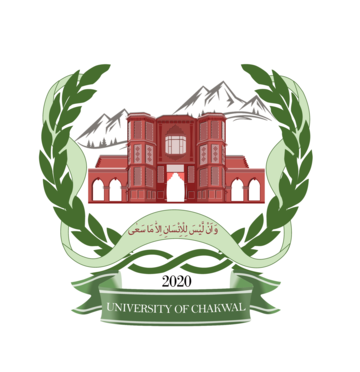Department of Computer Science
Vision
To create the most conducive environment for quality academic and research oriented undergraduate and postgraduate education in computer science to prepare the students for a globalized technological society.
Mission
To create, share, and apply knowledge in Computer Science, including interdisciplinary areas that extend the scope of Computer Science and benefit humanity; to educate students to be successful, ethical, and effective problem-solvers and life-long learners who will contribute positively to the economic well-being of the country and who are prepared to tackle complex computational challenges facing the world.
Program Educational Objectives (PEOs)
The four program educational objectives (PEOs), as given below forms the basis of the Department of the Computer Science at University of Chakwal, Chakwal. Within few years of graduation, the students with bachelor’s in Computer Science department are expected to attain the following.
- PEO1: Strong competence in Computer Science resulting in successful careers as software developers, solution designers, system analysists, and business entrepreneurs etc.
- PEO2: Pursue research and innovation to be able to provide novel industrial solutions for analytical and technical problems.
- PEO3: Leading or participating in efforts to address societal and technical / business challenges.
- PEO4: Enhancing their technical knowledge and professional growth through continuing education, effective communication by observing the professional ethics.
Curriculum
Will be shared soon.
Programme Learning Outcomes (PLO's)
Adoption of PLOs
The Department of Computer Science has adopted the Programme Learning Outcomes. These PLOs relate to the aptitude, awareness, and performance that students acquire with the progression of the program.
PLO-01: Engineering Knowledge
An ability to apply knowledge of mathematics, science, engineering fundamentals and an engineering specialization to the solution of complex engineering problems.
PLO-02: Problem Analysis
An ability to identify, formulate, research literature, and analyse complex engineering problems reaching substantiated conclusions using first principles of mathematics, natural sciences, and engineering sciences.
PLO-03: Design/Development of Solutions
An ability to design solutions for complex engineering problems and design systems, components or processes that meet specified needs with appropriate consideration for public health and safety, cultural, societal, and environmental considerations.
PLO-04: Investigation
An ability to investigate complex engineering problems in a methodical way including literature survey, design and conduct of experiments, analysis and interpretation of experimental data, and synthesis of information to derive valid conclusions.
PLO-05: Modern Tool Usage
An ability to create, select and apply appropriate techniques, resources, and modern engineering and IT tools, including prediction and modelling, to complex engineering activities, with an understanding of the limitations.
PLO-06: The Engineer and Society
An ability to apply reasoning informed by contextual knowledge to assess societal, health, safety, legal and cultural issues and the consequent responsibilities relevant to professional engineering practice and solution to complex engineering problems.
PLO-07: Environment and Sustainability
An ability to understand the impact of professional engineering solutions in societal and environmental contexts and demonstrate knowledge of and need for sustainable development.
PLO-08: Ethics
Apply ethical principles and commit to professional ethics and responsibilities and norms of engineering practice.
PLO-09: Individual and Teamwork
An ability to work effectively, as an individual or in a team, on multifaceted and /or multidisciplinary settings.
PLO-10: Communication
An ability to communicate effectively, orally as well as in writing, on complex engineering activities with the engineering community and with society at large, such as being able to comprehend and write effective reports and design documentation, make effective presentations, and give and receive clear instructions.
PLO-11: Project Management
An ability to demonstrate management skills and apply engineering principles to one’s own work, as a member and/or leader in a team, to manage projects in a multidisciplinary environment.
PLO-12: Lifelong Learning
An ability to recognize importance of and pursue lifelong learning in the broader context of innovation and technological developments.
Faculties

Dr. Shafique Ur Rehman
Assistant Professor
Ph. D Mathematics
Islamic International University Islamabad, Pakistan

Hina Iftikhar
Lecturer
MS Computer Science
COMSATS University Islamabad, Pakistan

Wasi Haider
Lecturer
MS Computer Science
PMAS-Arid Agriculture University Rawalpindi Pakistan

Muhammad Wajahat Lateef
Lab Engineer
BSc. Computer Engineering
University Of Engineering And Technology Taxila Pakistan


